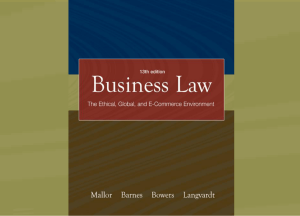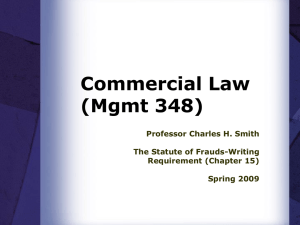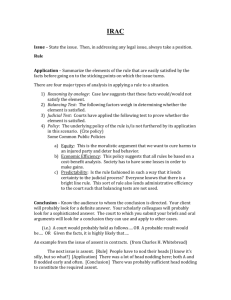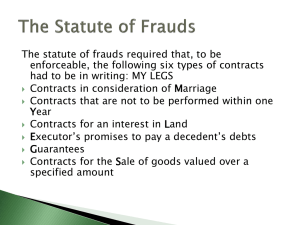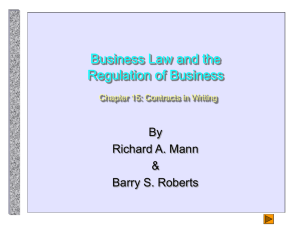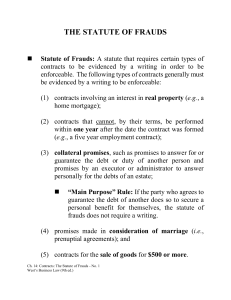Contracts that must be in writing under the Statute of Frauds
advertisement
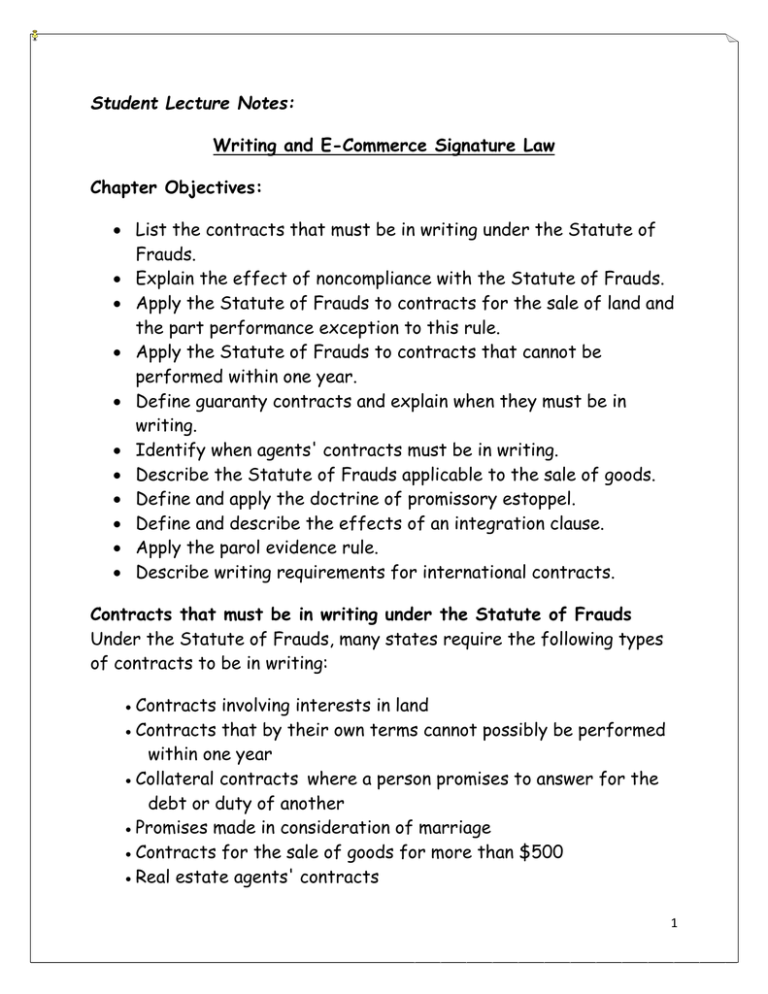
Student Lecture Notes: Writing and E-Commerce Signature Law Chapter Objectives: List the contracts that must be in writing under the Statute of Frauds. Explain the effect of noncompliance with the Statute of Frauds. Apply the Statute of Frauds to contracts for the sale of land and the part performance exception to this rule. Apply the Statute of Frauds to contracts that cannot be performed within one year. Define guaranty contracts and explain when they must be in writing. Identify when agents' contracts must be in writing. Describe the Statute of Frauds applicable to the sale of goods. Define and apply the doctrine of promissory estoppel. Define and describe the effects of an integration clause. Apply the parol evidence rule. Describe writing requirements for international contracts. Contracts that must be in writing under the Statute of Frauds Under the Statute of Frauds, many states require the following types of contracts to be in writing: Contracts involving interests in land Contracts that by their own terms cannot possibly be performed within one year Collateral contracts where a person promises to answer for the debt or duty of another Promises made in consideration of marriage Contracts for the sale of goods for more than $500 Real estate agents' contracts 1 Agents' contracts where the underlying contract must be in writing Promises to write a will Contracts to pay debts barred by the statute of limitations or discharged in bankruptcy Contracts to pay compensation for services rendered in negotiating the purchase of a business Finders fee contracts Noncompliance with the Statute of Frauds Generally, an executor contract that is not in writing even though the Statute of Frauds requires it to be is unenforceable by either party. Statute of Frauds and contracts for the sale of land Contracts that transfer an ownership interest in real property must be in writing under the Statute of Frauds to be enforceable. Real property includes the land itself as well as buildings, trees, soil, minerals, timber, plants, crops, and other things permanently affixed to the land. Fixtures, personal property that is permanently affixed to real property, such as built-in cabinets in a house, become part of real property. Contracts involving most other interests in real property, such as mortgages, leases, life estates, and easements, must be in writing. Statute of Frauds and contracts that cannot be performed within one year To prevent contract disputes that may occur toward the end of a longterm contract, contracts that cannot be performed within one year, by the contracts own terms, must be in writing. If the performance of the contract is possible within one year, the contract may be oral. Guaranty contracts A guaranty contract or collateral contract occurs where one person 2 agrees to answer for the debts or duties of another person. Collateral promises must be in writing under the Statute of Frauds. Agents' contracts Many states require that agent's contracts to sell property covered by the Statute of Frauds must be in writing to be enforceable. This is called the equal dignity rule. Statute of Frauds and the sale of goods Contracts for the sale of goods costing $500 or more must be in writing under section 201 of the Uniform Commercial Code Statute of Frauds. Promissory estoppels Promissory estoppel is an equitable doctrine that permits enforcement of oral contracts that should have been in writing. The following conditions must be met: The promise induced action or forbearance of action by another. The reliance on the oral promise was foreseeable. Injustice can be avoided only be enforcing the oral promise. Integration clauses The signature of the party against whom enforcement is sought needs to be on the written contract. Several writings can be integrated to form a single contract. Integration can be by express reference or may be implied from the circumstances. Standards of interpretation Ordinary words are given their usual dictionary meaning. Technical words are given their technical meaning, unless a different meaning is clearly intended. Specific terms are presumed to qualify general terms. 3 When a preprinted form is used, typed words prevail over preprinted words. Handwritten words prevail over both preprinted and typed words. If there is an ambiguity in the contract, the ambiguity will be resolved against the party who drafted the contract. If both parties are members of the same trade or profession, words will be given their meaning as used in the trade. Words will be interpreted to promote the principal object of the contract. Parol evidence rule Oral or written words outside the contract are called parol evidence. Under the parol evidence rule, if a written contract is a complete and final statement of the parties agreement, any prior or contemporaneous oral or written statements that alter, contradict, or are in addition to the terms of the written contract are inadmissible in court regarding a dispute over the contract. Exceptions to the parol evidence rule Parol evidence may be admitted if it: Shows that a contract is void or voidable. Explains ambiguous language. Concerns a prior course of dealing or course of performance between the parties or a usage of trade. Fills in the gaps in a contract. Corrects an obvious clerical or typographical error. Terms collateral contract—A promise where one person agrees to answer for the debts or duties of another person. easement—A given or required right to make limited use of someone else's land without owning or leasing it. 4 equal dignity rule—A rule that says that agent's contracts to sell property covered by the Statute of Frauds must be in writing to be enforceable. fixtures—Personal property that is permanently affixed to the real property, such as built-in cabinets in a house. guarantor—The person who agrees to pay the debt if the primary debtor does not. guaranty contract—The contract between the guarantor and the original creditor. incorporation by reference—When integration is made by express reference in one document that refers to and incorporates another document within it. integration—The combination of several writings to form a single contract. lease—A transfer of the right to the possession and use of the real property for a set term in return for certain consideration; the rental agreement between a landlord and a tenant. life estate—An interest in the land for a person's lifetime; upon that person's death, the interest will be transferred to another party. main purpose or leading object exception—If the main purpose of a transaction and an oral collateral contract is to provide pecuniary benefit to the guarantor, the collateral contract does not have to be in writing to be enforced. merger clause—A clause in a contract that stipulates that it is a complete integration and the exclusive expression of the parties' agreement. Parol evidence may not be introduced to explain, alter, contradict, or add to the terms of the contract. mortgage—A collateral arrangement where a property owner borrows money from a creditor who uses a deed as collateral for repayment of the loan. 5 one year rule—An executory contract that cannot be performed by its own terms within one year of its formation must be in writing. parol evidence rule—A rule that says if a written contract is a complete and final statement of the parties' agreement, any prior or contemporaneous oral or written statements that alter, contradict, or are in addition to the terms of the written contract are inadmissible in court regarding a dispute over the contract. parol evidence—Any oral or written words outside the four corners of the written contract. part performance—An equitable doctrine that allows the court to order an oral contract for the sale of land or transfer of another interest in real property to be specifically performed if it has been partially performed and performance is necessary to avoid injustice. promissory estoppel—An equitable doctrine that prevents the withdrawal of an offer by an offeror if it will adversely affect an offeree who has adjusted his position in justifiable reliance on the offer. real property—The land itself as well as buildings, trees, soil, minerals, timber, plants, crops, and other things permanently affixed to the land. Statute of Frauds—State statute that requires certain types of contracts to be in writing. UCC Statute of Frauds—A rule that requires all contracts for the sale of goods costing $500 or more and lease contracts involving payments of $1,000 or more to be in writing. Internet Links Legal Information Institute: http://www.law.cornell.edu/lexicon/statute_of_frauds.htm 6 Electronic Signature Legislation: http://library.findlaw.com/1999/Jan/1/241481.html Extracted from Pearsons 7
